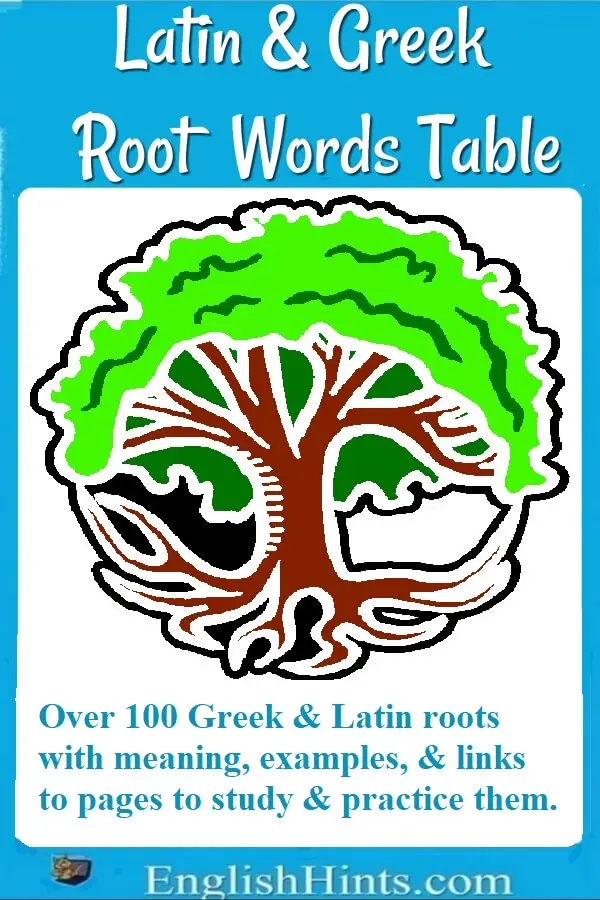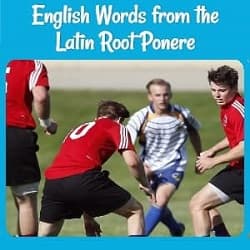100 + Latin & Greek Root Words
The table on this page lists over 100 root words. It gives their meanings, examples of English words made from them, and the pages on EnglishHints where you can study and practice them.
This table also serves as an index to the pages where you can learn English words from Latin and Greek roots.
More than 80 of these roots are from Latin. (Many are from Latin via French-- the biggest source of English words after Old English).
The root words that come from Greek have an asterisk (*) in front of them. (Many Latin words also originally came from Greek. These are the ones that came more directly, or kept their Greek form.)
How Root Words Can Help You Learn English
Recognizing word roots can increase your reading comprehension as well as your vocabulary.
I started the roots and prefix section of EnglishHints after noticing how much important vocabulary comes from a fairly small group of Latin roots.
(They dominate the Academic Word List and lists of frequent TOEFL words. Many are quite common in non-academic writing as well.)
If you know prefixes and a root’s meaning, you can often guess unknown English words that come from that root.
A few of the most common prefixes and their meanings are listed below, to help you figure out word meanings.
You can also check the List of Prefixes for a more complete list. (Greek and Latin Prefixes has a reverse list alphabetized by their meanings in English.)
Prefix: Meaning
- ad- (or a-): toward
- ab- : away from
- com-/con-/co- : with
- ex- (or e-) : out
- in-, im-, il- : in, inside, OR not (Inactive means not active; immobile means not moveable)
- pre-: before
- pro-: forward
- post- : after, behind
- re-: again or backward
- sub-: under
- trans-: across or through
- un-: not
For example, the Latin root cedere (and its English forms -cede, –ceed, or -cess) mean to go. The root gradi (-gress) means to step.
So the English word precede means to go before. Process (& procedure) are the way to do something-- to cause it to go forward. A procession is (a lot of people) going forward. Progress and progression are forward steps, Recede, recession, regress, and regression all refer to going backward.
How to Decode New English Words
The root words table below can help you decode English words you don’t know. (To decode can mean to translate a secret code into ordinary speech. It also means to look at the pieces of a word to figure out its possible meaning.)
To decode an English word, drop its prefixes and suffixes to find its root. (Take away the prefixes above and any others you recognize. Also remove word endings like -ing, -tion, -ly, -ment, or –ness.) So the root of ‘demobilize’ is ‘mobil(e),’ and the root of ‘extractible’ is ‘tract.’
Then check this table to find the root word’s meaning and pages to practice it and learn other, related words. (Many of those pages also explain meanings that have moved away from the root meaning over time.)
Root Form & Spelling Differences
You might notice that some roots have several forms. I’ve tried to put the variant English forms in parentheses when they are quite different.
For example, the Latin root videre, to see, has English derivatives like ‘video’ and ‘evidence.’ But it also has ‘visual’ and ‘invisible’—from another form (the past participle) of videre. So after videre I added (vis).
Claudere (to close) is the root of include, inclusive, exclude and exclusive. I added (clus) after the verb name so you can see the second common base form. Pellere-- to drive-- often has a base form (puls). It’s the root of impel, impulse, repel, and repulsive, among others.
Vowels also often change. Au turns to u in claudere, above. Ae changes to e (or i) in aequare (equal, equity, and iniquity) or quaerere (quest, inquire, and inquisitive.)
Page Abbreviations: find practice pages
To save space in the table, I used abbreviations for the practice pages for each root word. Here is a list of links to explanation and practice pages, with their abbreviations first:
Abbrev: Page:
+mt Match Words from Latin Roots
Comp Roots of Comparison
Sense Sense Vocabulary
Pon Words from the Latin Root Ponere.
Cls Vocabulary from Classical Roots,
G+L Words from Greek and Latin Roots
Gk Greek Roots
WFam Word Families
Root Words, Meanings,
Examples, & Practice Pages
A - D
| ROOT & MEANING | EXAMPLES | PAGES: |
|---|---|---|
| actum- an act | action, interactive | 50, WFam |
| aequus (eq)- equal | equate, equinox | 50 |
| ambiguous- uncertain | ambiguous, ambiguity | Cls,G+L |
| *analogia- similar proportions | analogous, analogy | Cls |
| *analysis- separation into parts | analytical, analyze | Cls |
| *anthropo- man, human | anthropoid, anthropology | Gk |
| audire- to hear | audition, inaudible, | Sense |
| *bios-life | biologist, biosphere | Gk. |
| caedere (cid)-to cut or kill | accidental, suicide | 50+pr |
| cedere (cess)- to go or yield | concede, success | Imp, Cls |
| centrum- center | concentrate, geocentric | G+L |
| *chrono- time | anachronism, chronological | Gk |
| civilis- related to citizens | civic, civilization | Cls |
| clamare- to shout | claim, proclamation | 50 |
| classis- class, group | classic, classification | Cls |
| claudere (clus)- to shut or close, | claudication, exclusive | 50+pr |
| clinare- to lean | declining, inclined | 50+pr |
| comparare- to place together | compare, comparison | Comp |
| crescere- to grow | crescent, decreasing | 50 |
| *cris, crit- to judge or decide | critic, hypocritical | Gk |
| currere- to run | course, currency, recur | 50 |
| dicere- to say | dictionary, verdict | 50+mt |
| differre- to set apart | difference, indifferent | Comp |
| distinguire- to separate between | distinction, indistinct | Comp |
| dominari- to rule | domination, predominant | Cls,G+L,Pow |
| domus- home, house | domain, domestic | Power |
| ducere- to lead | deduction, induce | Imp* |
| durare- to harden or to last | duration, endurance | 50 |
* Remember, you can find the practice page names and links on the pink page abbreviations' list just above the table.
F - L
| facere (fect, fi)- to make | artificially, effective | 50 |
| ferre- to bring, carry | conifer, inference | 50+pr |
| finis- end, limit | definitive, infinite | 50+pr+mt |
| firmare- to make firm | affirmation, infirmity | 50 |
| flare (flat)- to blow | deflation, inflate | 50 |
| flectere (flex)- to bend | flexible, reflection | Mot |
| fligere (flict)- to hit (someone) | afflicted, conflicting | 50 |
| fluere- to flow | affluence, fluent | 50 |
| formare- to shape | form, conform, reformation | 50 |
| fundere (fus)- to melt or pour | confound, infusion | 50 |
| *geo- earth | geologist, geography | Gk |
| gradi(gress)to step | gradual, progress | 50 |
| *graphein- to write | infographic, phonograph | Gk |
| gregare- to herd | congregate, segregation | 50 |
| haerere- to attach | adhesions, coherent | 50+mt |
| *ideologia- study of ideas | ideological, ideologue | Gk, Cls |
| integrare- to make whole | disintegration, integrity | 50+mt |
| jactare (ject)- to throw | dejection, projectile | 50+pr |
| jungere (junct)- to connect or join | disjunction, juncture | 50 |
| labor- work | collaboration, laboratory | 50 |
| latus- side, broad | equilateral, latitude | 50 |
| legis- law | illegally, legitimize | 50+pr |
| locus- place | allocation, relocate | 50+pr+mt |
| *logo- word or thought | logical, psychologist | Gk,Cls,G+L |
M - R
| mandare- to command | commander, demanding | 50 |
| mergere- to dip in water | emerge, immerse | G+L |
| *metron- measure | centimeter, odometer | Gk |
| miles- soldier | militant, militia | Cls |
| *morpho- shape | metamorphic, morpheme | Gk |
| movere (mob/mot)- to move | motivate, mobile, remove | Mot |
| norma- carpenter’s square | abnormality, norm | Cls,G+L |
| *patho- suffering, disease | apathy, pathology | Gk |
| pedis- foot | expedite, pedestrian | 50 |
| pellere (pulse)- to drive | impel, pulse, repellant | Mot |
| *philo- love of | philanthropy, pedophile | Gk,Cls,G+L |
| *phobia-fear | acrophobia, phobic | Gk |
| physica- study of nature | physical, physics | G+L |
| *phone- sound | cacophony, stereophonic | Gk |
| *photo- light | photocopy, photovoltaic | Gk |
| plicare, to fold | complicity, replica | 50+pr |
| *polis- city | metropolitan, politics | Gk |
| ponere (pos)- to put or place | decomposed, postpone | Pon |
| portare- to carry | deportation, supporter | 50 |
| pressare- to push against | impression, press, suppress | Mot |
| *psyche- soul | psychopathy | Gk |
| quaerere (quir, ques)- to look for (seek) | inquiry, quest, require | Imp |
| rationalis- related to reason | irrational, rationality | G+L |
| rectus- right, straight | correctible, rectitude | 50 |
| ruptus- broken | disrupt, incorruptible | 50 |
S - V
| *scope- to look at | microscopic, telescope | Gk,G+L |
| scribere (scrip)- to write | describe, inscription | 50+mt |
| secures (sur)- safe | security, reassurance | 50 |
| sensus- sense | insensitive, sensory | Sense |
| sequi- to follow | consequence, sequential | 50+mt |
| servare- to protect | conservation, preservative | 50 |
| signare- to make a mark | designate, significant | 50+mt |
| similis (sem)- alike | resemblance, similar | Comp |
| sistere- to stand up | consistency, persist | G+L |
| *sofia (soph)- wisdom | philosophical, sophistry | Cls |
| solvere (solu)- to loosen | dissolve, resolute, solution | 50 |
| specere (spic)- to look at | conspicuous, suspicious | Sense |
| spectare- to watch | introspection, spectator | Sense+mt |
| *sphere- ball | atmospheric, biosphere | Gk |
| spirare- to breathe | aspiration, inspiring | 50 |
| statuere (stit)- to set (up) | constitute, institution | 50+pr |
| struere- to build | constructive, destroy | 50 |
| sumere- to take | consumer, presumptuous | Cls |
| tangere (tact)- to touch | attainment, intact, tangible | Sense+mt |
| *techno- art, skill | technical, technologists | Gk |
| *tele- far | telepathy, television | Gk |
| tendere (tens)- to stretch | distention, extensive | Mot |
| tenere (tain)- to hold | container, tenacious | Imp |
| terminus- boundary or end | term, termination | 50 |
| testari- to bear witness | attestation, testator | 50 |
| *theoria- look at, think about | theoretical, theory | Cls, G+L |
| *thermo- hot | thermometer, thermos | Gk |
| *thesis- a proposition | hypothetical, synthetic | Gk,G+L |
| torquere (tort)- to twist | distortion, tortuous | 50+pr |
| trahere (tract)- to pull | attraction, extract | Mot |
| tribuere- to divide among, pay | distribution, tributary | 50+pr |
| turbare- to trouble | disturb, turbulent | 50 |
| venire- to come | event, prevention | Imp |
| vertere (vers)- to turn | conversion, inverted | Imp |
| videre (vis)- to see | evidence, invisible, vision | Sense |
| vocare- to call | advocate, vocal | imp |
| volvere- to turn around | devolve, revolt | 50+pr |
Go to the list of abbreviations and page links if you want to practice any root.
Roots, Prefixes, and Suffixes has links to all the root words’ explanation and practice pages. It also links to prefix and suffix lists. If you would like to study the roots that contribute the most to English, start with:
So many English words come from the Latin root ponere (pon- or pos-) For example: The opposing team imposed their will until they exposed their weakness.
More English roots-- from Latin verbs of motion: attract (pull towards), & retract from the Latin root meaning 'pull;' compel, compulsive, expel, & repulsive from the root for 'driven'-- and more.
Learn and practice the Greek roots most commonly used in English (from tele: far and graph: writing to psych: soul and logy: study of).
If you're interested in teaching roots, check out the inexpensive lessons and practice activities on Root, Prefix, and Suffix Worksheets.
Home> Roots, Prefixes, and Suffixes> Latin & Greek Root Words.
Didn't find what you
needed? Explain what you want in the search box below.
(For example, cognates, past tense practice, or 'get along with.') Click to see the related pages on EnglishHints.
| site search by freefind | advanced |











